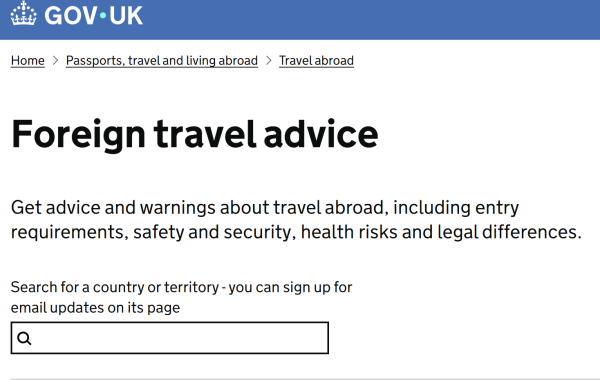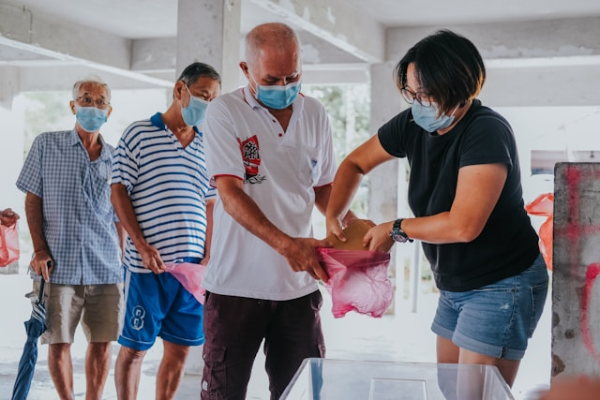Everybody’s heart goes out to those affected by a disaster, whether it’s a tsunami, wildfires, earthquakes, floods, or other natural disasters. But how do we know if it’s safe or morally right to visit a country?
If you visit, you might be taking up a room that a homeless family needs, using the limited food and water supply, and, on a personal note, you might find the attractions you planned to visit destroyed or closed.
On the other hand, if you don’t go, you are withholding valuable funds that they desperately need. The country has already had one disaster, and if all tourists decide not to visit, this will be like a second disaster, especially for countries that rely heavily on tourism.
Every situation is unique, but the following factors should be taken into consideration to make an informed decision.
Will it occur again?

Some events, such as a dam bursting or a major tsunami, occur once and then the situation is resolved, making it easier for you to decide what to do. Earthquakes often have a major tremor but can also have additional tremors and aftershocks for a few days or even weeks afterwards. These secondary tremors might not be as severe, but with structures already damaged, they can cause problems.
However, some situations, such as civil unrest or wildfires, can persist for weeks, requiring continuous reassessment before departure.
How bad is the situation?
It can sometimes be challenging to judge a situation accurately, as the media often exaggerates the severity.
Many years ago, I was watching a reputable news program that featured an item about flooding in Asia. They showed a man up to his shoulders in floodwater. Just as the item ended, I thought I saw the man stand up. I was able to rewind the programme and watch it frame by frame, and could confirm that the man had been crouching down in the water to make the flooding look worse. I was shocked such a respectable organisation would do such a thing, and have always been suspicious of reports on disasters since then.
Once on holiday in Vegas, a security guard told us he had just left the UK in time before all the riots. There had been some riots in London about 10 years before; they were in Brixton, and over 300 people were injured. It must have been terrifying for those living in Brixton; I wonder just how the situation was reported around the world. I wouldn’t have recommended going near Brixton at the time; however, Vegas has numerous fatal shootings each year, including a mass shooting in 2017 where 58 people were killed. Statistically, Las Vegas is considered a more dangerous city than London.
Accessing the situation is not easy; the number of people killed can give you an idea of the scale of the problem. Try and look at the facts and not be influenced by photos of dead bodies covered up and heartbreaking interviews. What is the scale of the problem? Will it recur? And how has it affected the local infrastructure?
What does your Government say?

In the UK, the government advises its citizens on whether other countries are safe to visit, see https://www.gov.uk/foreign-travel-advice.
If it says the country or region isn’t safe, then you shouldn’t go, as your insurance will be invalid. If you booked through a travel agent, you may be able to switch to an alternative location. However, if you booked independently, you may have lost your money if your travel insurance policy doesn’t cover disaster situations.
Take a look at the government websites of other countries. Sometimes, looking at the websites of the US or Australian governments provides a different perspective, with more details, or they may have been updated recently, especially if the country is a major tourist destination.
Where is the problem?
When there were riots in Brixton, we wouldn’t think it was unsafe to go to Cornwall, and most of London was safe. However, when people hear of a disaster in one part of a country, they dismiss the whole country as unsafe.
When Haiti experienced an earthquake in 2010, the entire island required all its resources to assist its population, and it didn’t need any tourists adding to the problem. Still, when there were bushfires in Australia, the whole country didn’t need to be avoided. Although the bushfires covered a large area, Australia is so vast that it is comparable to avoiding Denmark because of an earthquake in Italy.
Pinpoint exactly where the problem is. Look at your destination. Will you have to travel near the disaster location, or is it near a major port or airport that might bring supplies into the country or island?
Is it safe for you to go?

Just because something dreadful happened, it doesn’t mean it is going to happen again when you are there. In earthquake zones, there is always a chance that an earthquake will occur, and in areas prone to flooding, there is often a period when flooding is more likely.
Sometimes, immediately after a disaster, people are more aware of the problem, and especially after a man-made disaster, it can be safer. In 1987, in Belgium, someone on a ferry forgot to check that the doors were secured, which led to a high death toll. You can be sure every ferry double-checks its doors immediately after that disaster.
When a disaster strikes in an area, it can cause problems that can take weeks, months, or even years to recover from. Buildings collapse, electricity supplies can be disrupted, roads and bridges are destroyed, and water and sewage pipes are damaged. It all depends on the type of disaster.
Cholera is a bacterial disease which spreads through contaminated water, and it can be fatal. There is a risk of cholera after a disaster due to poor hygiene, especially in less developed countries that lack the resources to quickly equip locals with the necessary tools to maintain good hygiene practices. In Haiti in 2010, 300,000 lives were lost due to an earthquake, but almost 10,000 people died afterwards due to cholera.
If you have a medical condition that occasionally requires medical attention, I would recommend delaying your holiday or changing locations to another country, unless the country you are visiting has extensive medical resources.
Assess whether the country has the resources to restore its basic needs quickly. You will need to consider the extent of the disaster’s destruction and the country’s wealth.
Should you go to support the locals?

Firstly, I wouldn’t advise anyone to dash off to a disaster area to help with the recovery. If you have a skill which might be useful, contact the agencies and charities to see how your skill can fit into the requirements. If you arrive in a disaster area, you are only adding to the problem.
If you want to help, consider donating to charities that support the area, but make sure they are genuine. My daughter worked in a small charity shop that helps refugees, and when Turkey experienced an earthquake in 2023, they were one of the first teams on the ground assessing the needs and providing supplies. The money the charity shops raised went immediately to help those in need. So, if you can donate or buy items from charity shops like Oxfam.
If you had planned a holiday in the area where the disaster occurred, your presence would be unwelcome until the situation is resolved. However, in other parts of the country that can cope with tourists, your support is vital.
Everyone knows how hard it was for the tourism industry during the pandemic. If a country is rejected as a holiday destination because of a disaster, it will be without the funds when it needs them the most.
When you go on holiday, you are supporting the staff working at your hotel, restaurant staff, owners, guides, taxi drivers, and shop staff, among others. In 2020, the tourism industry in Thailand contributed 65.7% of the country’s GDP (Gross Domestic Product). Just imagine what would happen if Thailand lost most of this income, while also having to pay out to support those in need.
When wildfires broke out on Maui in 2023, tourists were initially advised not to visit, but three weeks later, many people were pleading with them to return. Those working in the tourist industry were worried they couldn’t cope with the loss of income.
Some people thought it was too soon for tourists to come and enjoy themselves when others were hurting so much.
If you do visit a disaster site soon after, be sensitive to the feelings of others. Once our tent was destroyed in a storm, and as we were dragging all our belongings out of the broken tent, people were videoing us. I thought they could at least help us, maybe offer us a hot drink instead of just filming our misfortune without saying a word. If a person had lost a house or even a relative, imagine how much worse they would feel if you stood there taking photos.
By all means, show your photos that demonstrate how the country is open for business, but if you show any pictures of the disaster, it might backfire and upset people.
If you are unsure whether it is too soon to visit a country, contact the hotel you have booked and ask if they are open for business. Then, verify that all facilities are running normally and that there are no restrictions on tourism in the area. Once you have all the information, along with what your government says, you will have a clear picture of the situation.
Will my holiday be ruined?
On a purely selfish note, some people have found that they have a brilliant holiday if they visit a destination quickly after it has been shunned. This is because hotels are cheaper, encouraging tourists to return. Locals are pleased to see them, and with fewer tourists around, you can enjoy a place like never before.
However, it is not always like this. If you go near where a disaster took place, the streets and beaches can be full of homeless people in homemade tents, transport is limited, supplies are limited, and many things are not operating as usual.
Take a look at other people’s recent reviews and see if they had any problems. If it’s too soon after the event to find any reviews, then wait until you have a clearer picture. Often, you can find out from the media if an area is open for tourists again.
After every disaster, the country wants to show it is open again for business as soon as possible. You will need to judge how willing you are to go when things might not be perfect.
Booking a holiday
If you plan to book a holiday to a country that has recently experienced a disaster, I suggest choosing a small company that specialises in that area. They will have local contacts and know where to go or avoid. They might also be able to provide opportunities for you to visit villages or local places where your money is needed most.
Be realistic

It still surprises me when people go on holiday and expect the same things they get at home. I have seen Americans rate a hotel down because it doesn’t have a flannel in the bathroom, and English people complain because of no kettles in the bedroom.
If you go after a disaster, you must be prepared for the fact that some services may not be as good as they were before the disaster. There could be supply shortages, staff shortages, and attractions closed or destroyed.
I once arrived at an RV park and found that the restaurant I had planned to eat at was destroyed the day before in a severe storm.
If something like the swimming pool is important to you, make sure it is open. Things might not be perfect, but they will be doing their best.
What if my holiday is immediate, and the disaster just happened?

Governments usually take a few days to assess a situation, but the media is quick to announce death tolls and where the disaster happened.
If you have booked through a travel company, they may be able to give you advice, especially those who specialise in that area. However, some companies only have contact with their hotels and are unaware of the general situation.
If your holiday was near a disaster or large numbers of people were injured and killed, swap your holiday to another destination if you can. If it is a large country, it can be located elsewhere within the same country.
If you have booked independently, please get in touch with your hotel to determine their preferred course of action. They may allow you to change your holiday dates until things have settled down. Unfortunately, you might lose your airfare. Don’t cancel your flight as you will get nothing back; however, you might find the airline cancels the flight, and therefore, you will be entitled to a refund.
If your hotel doesn’t answer emails or phone calls, it’s best not to go if it’s in the area of the disaster. Check their website to see any clues about their situation. Some smaller hotels maintain a Facebook page that is regularly updated.
Summary
When a disaster hits an area, we naturally want to avoid the place. This is undoubtedly the correct response immediately after the disaster. However, a few months later, the locals might suffer further if their businesses close because no tourists are visiting.
It is impossible to say whether you should visit a country or not after a disaster, as every situation is unique. We visited Canada shortly after it had some major flooding. They had called the army in to open some roads and clear the debris away. Although some areas were still under feet of water, we could work around these areas and still had an enjoyable holiday, but if we had gone only a week earlier, we wouldn’t have been able to travel around as planned.
I am sorry if you have to cancel a holiday that you were looking forward to. We did it once, but a few years later, we enjoyed it even more as we could then take two of our children with us.
If you book a destination that is desperate for tourists after a disaster, consider booking a hotel owned by locals, so the money stays in the local community. You never know; you might find some great deals and be welcomed with open arms by the locals. Have a great time when you manage to get there.

Leave a Reply